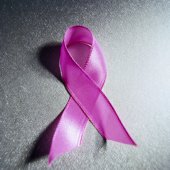
WEDNESDAY, June 1 (HealthDay News) — Beta blockers — safe, inexpensive drugs that have been used for decades by millions of people — may eventually have a role in fighting breast cancer, according to two new studies.
One study suggests that women who are already taking beta blockers to lower blood pressure tend to be diagnosed with breast cancer at an earlier stage of the disease and to have better survival odds.
The second study finds that women who took a beta blocker while undergoing chemotherapy for breast cancer had a lower risk of recurrence.
Both studies, whose authors declared no conflicts of interest, were released online May 31 in advance of publication in an upcoming print issue of the Journal of Clinical Oncology.
While the idea of dispensing a cheap drug with a good safety profile to women to combat breast cancer is enticing, these findings are hardly enough to recommend prescribing beta blockers such as propranolol (Inderal) for breast cancer, said an expert.
“These studies are hypothesis generating. I don’t think they are definitive by any means in terms of what physicians and patients should go out and do tomorrow,” said Dr. Lori Goldstein, director of the Breast Evaluation Center at Fox Chase Cancer Center in Philadelphia.
On the other hand, women with breast cancer who are already taking this class of drugs need not worry that “it’s going to jeopardize the care of their cancer,” said Dr. Amal Melhem-Bertrandt, lead author of the second study.
Beta blockers basically work by damping down the effects of epinephrine and norepinephrine, both stress hormones.
These stress pathways may also be involved in the spread of breast cancer.
“There’s a lot of literature out there that people under a lot of stress may have a higher incidence of their breast cancer recurring, meaning that the cancer may come back when they’re under stress,” said Melhem-Bertrandt, who is an assistant professor of breast medical oncology at the University of Texas M.D. Anderson Cancer Center in Houston. “We wanted to figure out if something [was] done pharmacologically to reduce epinephrine and norepinephrine, whether that would reduce the incidence of the cancer coming back.”
The first study connected 2001-2006 data from a large national cancer registry in Ireland with additional information from a pharmaceutical database. The researchers, from Ireland and the United States, identified 70 women who were taking the beta blocker propranolol and another 525 taking a different beta blocker called atenolol (Tenormin) in the year before they were diagnosed with breast cancer; they were matched with a control group of more than 4,700 women with breast cancer who had not taken beta blockers. All of the women were 40 or older.
Women taking the beta blocker propranolol were significantly less likely to be diagnosed with advanced cancer or to die from breast cancer. The longer the woman used propranolol, the better her outlook.
There was no similar association with the beta blocker atenolol, the study authors noted.
But the results could have been skewed by the fact that women who end up in these databases are actually visiting their doctor and being prescribed medicine, said Dr. Stephanie Bernik, chief of surgical oncology at Lenox Hill Hospital in New York City. “They’re more inclined to follow through with therapies and screening” and that might help explain their better prognosis, she said.
The researchers also cautioned that the propranolol group was so small that the results could have been due to chance, and that they needed to be confirmed in larger studies.
The authors of the second study went back to records on 1,413 women who had received chemotherapy for breast cancer and compared those who had been taking beta blockers to those who had not.
Overall, taking a beta blocker was associated with a 50 percent decrease in the cancer coming back but not overall survival, they found.
The benefit really seemed to be restricted to women with triple-negative breast cancer who had a 70 percent lower risk and who tend to have fewer options when it comes to treatments, said Melhem-Bertrandt.
Possible good news for all women, pointed out an accompanying editorial, is that these stress pathways can also be modified through lifestyle factors, such as weight management as well as curbing tobacco use.
More information
The U.S. National Cancer Institute has more on breast cancer.

